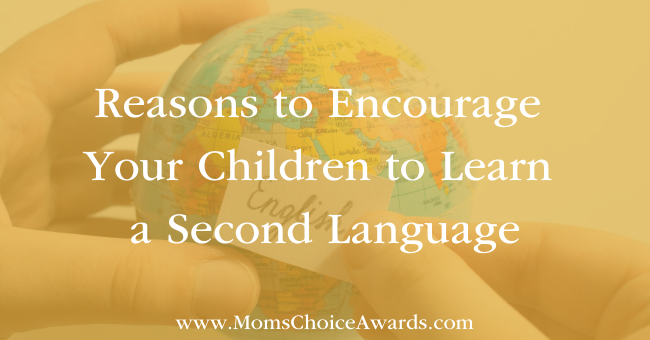 Draven Jackson
Draven Jackson
Blogger | Teacher
Twitter
As children grow older, there are many skills and lessons we know we need to teach them. They need to know how to read, tie their shoelaces, brush their teeth, and know their colors and numbers. With so much important knowledge to instill in them from early on, it can be hard to find time for other important, but frequently forgotten lessons.
One important educational topic that is commonly overlooked is the knowledge gained from learning a second language from a young age. Children who learn a second language young are shown to have improved test scores and problem-solving skills, greater empathy and cultural connection, and better opportunities as they grow older.
While there are many important lessons to teach your children and teaching them another language may not seem like the most pressing concern, here are some key reasons to encourage your children to learn a second language in order to help them lead more well-rounded, fulfilling lives.
It Improves Problem Solving Skills
 One of the best reasons to encourage your children to learn a second language is that it improves problem-solving skills and overall cognitive development. Children who learn a second language are constantly being mentally challenged in a way that helps improve their overall mental development.
One of the best reasons to encourage your children to learn a second language is that it improves problem-solving skills and overall cognitive development. Children who learn a second language are constantly being mentally challenged in a way that helps improve their overall mental development.
Research shows that children who learn a second language have better listening, problem-solving, multitasking, and concentration skills. Bilingual children also frequently have a better understanding of their primary language and a richer vocabulary.
It Encourages Creativity and Open-mindedness
By opening their mind to a larger language and worldview, you can not only help increase your child’s general knowledge, but you could also help improve their creativity and promote innovative thinking. Children who learn a second language have a much wider vocabulary base than children who only know one, which in turn helps them to improve their individual ideas and thoughts.
Plus, the cultural exchange that comes with learning another language allows them to have a wider worldview, helping them to see further outside their personal and physical space.
Learning a new language is also an incredibly arduous and painstaking process, so it is not only a lesson in language, but it is also an opportunity for them to learn patience and tolerance, which will help them in many other academic and social situations throughout their lifetime.
It Fosters Feelings of Empathy and Caring from a Young Age
As we said before, learning a second language is not only a linguistic exchange, it is also a cultural exchange that promotes tolerance, patience, and open-mindedness. By learning a second language, your children will also learn that there is more to the world than what they can directly see, feel, and experience.
They will come to understand that there are more people and experiences out there than what they personally come in contact with regularly, and will therefore have an increased ability to empathize and connect with individuals from all over the world.
It’s Much Easier to Learn Another Language at a Young Age
The best reason to teach your children a second language from a young age? It’s easier. Because their brains are still in development, children’s minds are more receptive to learning another language. A child’s brain is like a sponge and absorbs information much more easily than an adult brain does. On a biological level, they have a better capacity to receive and store information than an adult does.
However, once they hit puberty, the parts of their brain that can easily store languages begin to shut down, making it much more difficult for them to learn another language.
Also, children have less to learn and much more time than adults do. When you grow up, you’re bombarded with social rules, responsibilities, and the struggles of daily life. You have to go to work, take care of the family, make sure all your bills are paid – there’s no time to learn another language. However, children are full of time. And what better way to use that time than to learn an important skill that can benefit them as they grow older?
It Opens Doors as Children Grow Older
One amazing benefit that comes with learning another language is that it opens doors as children grow up. Bilingual children have more opportunities for traveling and seeing the world, connecting with other cultures and languages.
Knowing a second language is also an amazing resume booster, and colleges and programs all over the world view bilingual students as better-rounded than those who only know one language. With schools becoming more competitive than ever, having extra skills that can set you above the rest of the candidates will greatly increase your chances of being accepted.
It Leads to Increased Test Scores and Advanced Reading Skills
Students who are bilingual do much better overall on standardized tests. Not only have they gained the knowledge of a second language, but they also have increased patience and problem-solving skills, which helps decrease the panic that comes with timed, standardized testing. Studies show that students who have learned a second language have higher scores on the SAT than students who have not.
Plus, it actually helps decrease the crippling fear of failure that many students experience, especially during the test-taking season. Failing is an important part of learning a second language. Messing up words, conjugating verbs incorrectly, or flipping between languages because you can’t express exactly what you’re trying to say are all necessary mistakes for fully grasping a language.
Therefore, the idea of failing while learning another language is not only expected, it’s encouraged! Once students become comfortable with the idea of failing, they are much less likely to shut down or become overwhelmed in other academic situations, such as during standardized tests.
It Builds Connections
At the end of the day, learning a second language benefits not only your child’s academic abilities, but also their ideas, thoughts, and worldview. Learning another language will help them communicate with individuals from all over the world, and by doing so they will learn about other cultures and experiences, building a bridge between themselves and those they meet.
Whether they decide to travel abroad or stay near home, by encouraging your children to learn another language, you are giving them the opportunity to learn more about the world and the people that live in it, people who may be completely different than themselves. This will greatly improve their personal opportunities and experiences, and help them become more open, well-rounded human beings as they grow up.
Do you know of more reasons to encourage children to learn a second language? Tell us in the comments!
 About Draven Jackson
About Draven Jackson
Draven is an avid writer and reader who enjoys sharing her opinions on movies, books, and music with the rest of the world. She will soon be working as a teacher in Japan and hopes to use her experience to connect with other teachers and students around the globe. Draven spends most of her time at home with her family, her dogs, and her ferret.
To see more, view all posts by Draven Jackson here.
Save






2 Comments on “Reasons to Encourage Your Children to Learn a Second Language”
I agree. My dad was in the military when I was growing up and a few of his assignments were overseas. It gave me a chance to learn several languages. It helps you to communicate with others and the more you communicate, the more you can come to understand one another.
I would definitely agree it is easier to learn another language when you are younger!